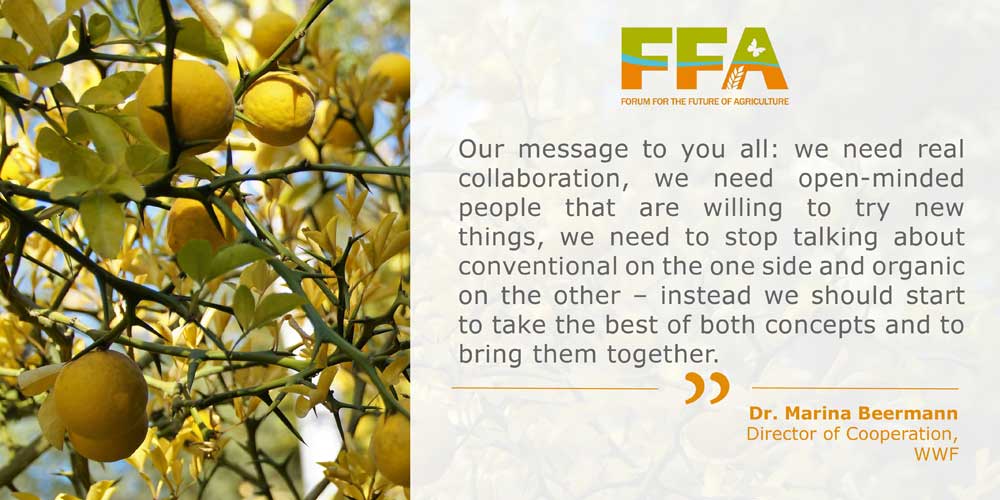EDEKA-WWF Zitrus Project, applying lessons learned and accelerating change
Dr. Marina Beermann, Director of Cooperation, WWF Germany
Tuesday, Apr 14, 2020
Dr. Marina Beermann, Director of Cooperation, WWF Germany explains the lessons learned during the Zitrus project and how they can be applied more broadly.
Andalusia in Spain is home to species-rich ecosystems. It is an important migration area for migratory birds and one of the last retreats for endangered species such as the Iberian lynx and the Spanish imperial eagle. At the same time, it is a center for fruit and vegetable cultivation in Europe; and this has led to a massive overuse of natural water resources by agriculture in recent decades.
The land-intensive, incorrect use of agrochemicals, the associated pollution of groundwater, and the loss of soil fertility and biodiversity are all associated with conventional cultivation practices in this Spanish region. Compared to other reference countries, the cultivation of oranges and mandarins in Andalusia results in the highest environmental costs(1) by far, especially due to the region’s water shortage. In the year 2015, WWF Germany/Spain and EDEKA decided to launch a project aimed at improving the cultivation of these types of citrus fruits and thereby reduce inherent environmental costs, starting with the supplier Iberhanse at the farm Iberesparragal. During the autumn and winter 2016/17, selected supermarkets in an EDEKA region were supplied with oranges from the pilot farm Iberesparragal for the first time.
With the support of the WWF and EDEKA, the farm had already implemented various measures in four areas:
1. More sustainable water use (on the farm and in the river-basin);
2. Integrated pest management;
3. Efficient fertilization and promotion of soil fertility and
4. Conservation and promotion of biological diversity and ecosystems.
Water scarcity and the illegal use of water are some of the biggest challenges in that region. Therefore, the project focuses on more sustainable water use at the farm and river-basin levels. All producers commit to documenting water consumption for the irrigation of their plantations on a daily basis and to comply with the water concessions allocated by the authorities. To prevent illegal use of water on the farms, wells without water concessions are shut down. In addition, the foundations for targeted improvements are put in place, for example, by installing soil moisture probes that help farmers to avoid water and fertilizer losses in irrigation.
Thanks to the implementation of optimization measures, the pilot farm Iberesparragal was able to save more than 211 million liters of water in one year. The farm also became the first agricultural enterprise in Europe to achieve AWS certification with Gold status, which was awarded for the third time worldwide.
The standards of the Alliance for Water Stewardship help producers implement more sustainable water management systems also beyond the boundaries of its operation in their local river basins in co-operation with other players. The certification represents confirmation from independent auditors that the farm uses water economically, avoids pollution and thus protects the ecosystem and the region.
However, the partners also want to initiate positive changes for other citrus producers, beyond the boundaries of the pilot farm. Moreover, the availability of sustainably-produced oranges and mandarins at EDEKA Group’s stores throughout Germany increased. In the year 2017, the partners therefore took a decision to expand the project. Since then, eleven additional farms were added to the project. Till the end of 2019, measures designed to achieve the project’s targets have been implemented on 939 hectares of land – with success. Based on data from our pilot farm Iberesparragal, an external consultancy calculated whether the project measurements lead to a reduction in environmental costs or not. The result: 36% less environmental costs per produced ton of oranges, considering the categories Land Use, Water Consumption, Pollutants and Green House Gases.
Source: https://verbund.edeka/presse/pressemeldungen/edeka-verbund-hat-die-umweltfreundlichste-orange!.html
More information on the project in English: Progress report 2018, includes also the citrus project.
More information: in German.
(1) Environmental costs are negative external costs that are not part of the price and are borne by society, e.g. costs for the treatment of drinking water contaminated by pesticides and fertilisers.
Dr. Marina Beermann
Director of Cooperation
WWF Germany
The views expressed above are those of the author(s) and are not necessarily endorsed by the FFA or its partners.


